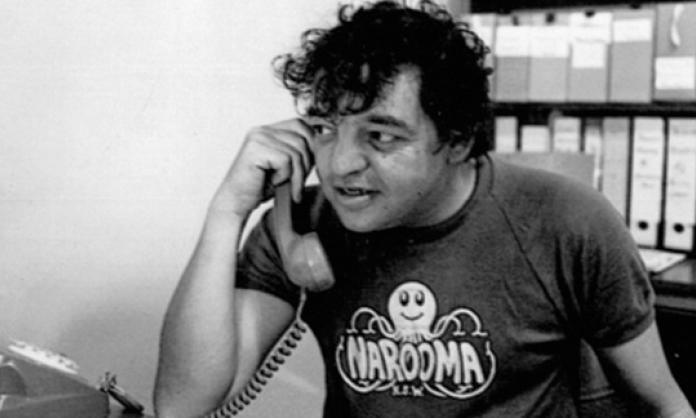It’s late July, a Melbourne winter’s day, and I’m sitting down with Davie Thomason. I want to ask him about his old comrade, the legendary working class Aboriginal fighter Kevin Cook. Kevin has died, just a few days before.
In the early 1970s, Kevin and Davie were organisers with the Builders Labourers’ Federation (BLs) in Sydney. BLs had fought to win control of their own union from the bosses and gangsters who dominated the BLF through the 1950s.
Having won that battle, during the construction boom of the early 1970s, BLs asserted their power over the building sites where they worked, and beyond. They used their industrial strength to support the struggles of Aboriginal people, women, gays, students and anti-war protesters. Most famously, union members refused to demolish working class housing, bushland, parks and historic buildings, launching the world famous green bans movement.
Davie flicks through Meredith and Verity Burgmann’s book on the NSW BLF of this time: Green Bans, Red Union. The first reference to Kevin Cook quotes him as saying, “The boss wasn’t really the boss. We knew it and he knew it”.
“That’s a great statement”, Davie says. It seems to sum up the strength felt among BLF members at that time – “knowing that you control the job”, as Davie puts it.
He remembers Kevin’s quietness and his strength, and the respect and affection shown to him by the rank and file of the union. But what Davie wants to talk about most of all is the solidarity that Kevin helped to forge in those years, between construction unionists and the Aboriginal struggles of the period.
When working class people are standing up and fighting back, as BLs and so many others were in the early 1970s, it’s not a huge leap to see that our liberation is bound up with everyone else’s. Far from “ordinary people” being eternally wedded to racism, it can become second nature to challenge racism and to stand up alongside those fighting it.
At the time, empty houses in Eveleigh Street in Redfern had been occupied by Aboriginal families. When property developers moved in to demolish the houses in late 1972, the BLF banned the demolition work. This was crucial in one of the first successful Aboriginal land rights claims in modern Australia.
Eveleigh Street and “the Block” around it were transformed into an Aboriginal housing co-op with health centre, kindergarten and other community facilities.
Davie tells me about the BLF support for the Black Moratorium, a nationwide mobilisation for Aboriginal land rights. He tells me about Kevin’s great mate, Roy Bishop, the man who got Kevin his start in the industry, who was later sacked for tying a giant banner advertising the Black Moratorium to the jib of his crane. Roy was reinstated after union protests, only to be sacked again and reinstated several times. On the day of the protest, the cops moved in: eight of the 13 protesters arrested were builders labourers.
The BLF fought against the construction of the new, maximum-security Katingal cell block within Long Bay Gaol, refusing to pour the concrete for the roof of the complex, while demanding more humane conditions for prisoners, black and white.
After talking, I want to refresh my memory of these struggles. Many of them are documented in Rocking the Foundations, one of the best movies ever made about working class struggle in this country.
Kevin appears about half an hour into the film, sitting with BLF president Bobby Pringle as they explain how the union won its disputes. Solidarity and defiance were the key.
If a job was on strike in the city centre, collections on the suburban sites would keep the fridges full for striking workers. If the dispute was shunted into arbitration, union members would pack out the courtroom. And if arbitration wasn’t going well for the workers, they would walk out, telling the construction bosses, “Well, see how you build your building without us”.
I track down a book recommended by a friend. Making Change Happen is a beautiful, rambling book that Cookie co-authored, in the last years of his life, with historian Heather Goodall. It’s full of interviews, photos and stories from Kevin Cook’s life and the struggles he was part of.
The book gives me a picture of the man, growing up Koorie in the working class neighbourhood of Cringila, Wollongong. “Living in Cringila, there’s every nationality on earth, plus a couple”, he wrote.
Kevin describes his first day on a construction site. Those were the days when a dogman would attach the load to the hook of a crane, and then “ride the hook” up with the load. Cookie’s first ride was in a kibble, a giant steel bucket for concrete. When he got to the top of the building, he’d been gripping so hard “you could see my fingerprints on the steel kibble … And I was heading down the stairs going home. But they talked me into staying …”
Cookie recorded a chat with his mate Bobby Baker, a prominent BLF activist. “First off”, Bobby explains, “we got wages, then we got safety and conditions on the jobs. I mean, there was nowhere to get changed on a job, you’d be working in the middle of Sydney, you’d get covered in crap and you went home like that.
“So they were the first issues, once you did those, you had some trust, the guys trusted you and we had mass meetings. We very rarely did any large issues without mass meetings, and because probably about 70 percent of our membership were migrants we made an effort to get stuff written up in at least three or four languages and try and get interpreters to meetings. By putting the whole of the issue before workers, and then asking what they thought, they trusted us really …
“And then we’d say, ‘Okay we want a 24 hour stoppage over Apartheid in South Africa’. We’d explain what’s happening there. We probably had more mass meetings than any other union in history.”
Kevin chips in: “The union was very democratic. It showed a lot of people, especially me, what could be done by a very small amount of people if they all stuck fat. And those principles have carried on, all the way through to working with Aboriginal people in the early land rights campaign”.
In 1975, the BLF was smashed by cops, courts, construction bosses and rival union branches. But Kevin went on to help run Tranby Aboriginal College in Sydney, using his contacts and organising skills to secure funding from left wing trade unions. He was one of the key organisers of the campaign that won the NSW Land Rights Act in 1983, and the colossal protests that marked the bicentenary year of 1988.
It’s months now since I sat with Davie, asking about his friend and comrade. Winter has given way to an uncertain Melbourne summer. I keep reading a bit more, tinkering with the words, uncertain what to say. I find myself wondering how to do justice to a man I never met, but whose life touched mine.
So perhaps it’s fitting I close the article with the final words of Davie’s tribute that day. “Vale comrade. Vale comrade Kevin Cook.”











